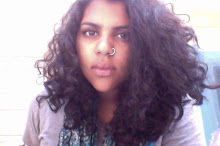 I don't want to be that girl. The one who idolizes Indian people. After all, Paul Chaat Smith, curator of the National Museum of the American Indian states in his book that non-natives tend to romanticize indigenous people as either cartoon characters in old Westerns or overtly spiritual people who worship the Earth and constantly singing about Pachamama's glories. But at the same time, when our green church van descended from the Great Smokies, I fell in love with the trailers and log cabins. The streams were full and overflowing because of the rain. Everything was shrouded in fog (maybe because I imagined this scene even before the trip and I projected this imagery or because of the thunderstorm that happened hours before our arrival). My earthy trip was disturbed by a large billboard that had a cartoon Indian with a war bonnet that read GET YER GOLD! What was that?!
I don't want to be that girl. The one who idolizes Indian people. After all, Paul Chaat Smith, curator of the National Museum of the American Indian states in his book that non-natives tend to romanticize indigenous people as either cartoon characters in old Westerns or overtly spiritual people who worship the Earth and constantly singing about Pachamama's glories. But at the same time, when our green church van descended from the Great Smokies, I fell in love with the trailers and log cabins. The streams were full and overflowing because of the rain. Everything was shrouded in fog (maybe because I imagined this scene even before the trip and I projected this imagery or because of the thunderstorm that happened hours before our arrival). My earthy trip was disturbed by a large billboard that had a cartoon Indian with a war bonnet that read GET YER GOLD! What was that?! 
He told me he was the economic manager of the tribe and once worked with the EPA before his rare stroke that made it difficult to work. He told me how the reservation got most of its income from tourism. That explained the GET YER GOLD sign. It was an attraction. He told me that the casino brought the company the most revenue. He told me the casino was tribally owned and provided the most jobs to tribal members. There was a hotel too. Even a Paula Dean kitchen! He said enterprise would save the community. He said he is thrilled whenever a tribal member would open a restaurant or hotel because the tribe would earn money from taxes and the family who opened the business would benefit too. The tribe, he said, relied on tourism for years. He told me of a man who wore a Sioux war bonnet and took pictures with tourists. Some people in the community got mad and questioned him because he was misrepresenting Cherokee traditions. Cherokees did not have war bonnets. But the man replied: say what you want, I paid for 4 kids through college. We laughed. And that was that. Eddy told me about the fisheries. The tribe was granted the opportunity to own one for rainbow trout. People come to fish rainbow trout for 5 dollars a day. And crafts are sold too. At this time, the little girl came to me and plopped down on my lap. She was beautiful: round eyes, cream skin, mahogany hair. Your pretty she said while stroking my hair. I laughed. She taught me some Cherokee: shi-ok. Hello. skee. Thank you. agua. Water.
And then it was time to sleep. But I knew I was going to stay up, wondering what other people were doing in their homes. Where did Eddy go to? And Jaya? How many brothers and sisters did she return to? Did she have a mommy and daddy? The town, its a funny town, I thought. Riddled by forests inhabited by trailers and totem poles (for the tourists. Totems are traditionally from North Western tribes. Hey, but its for money). So where did that leave me? I would soon find out.


No comments:
Post a Comment